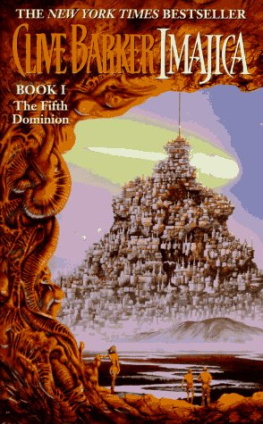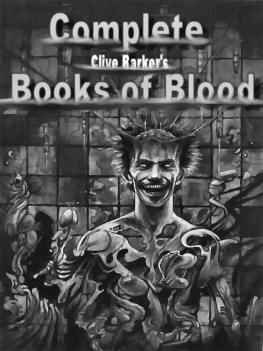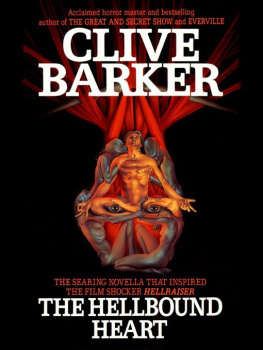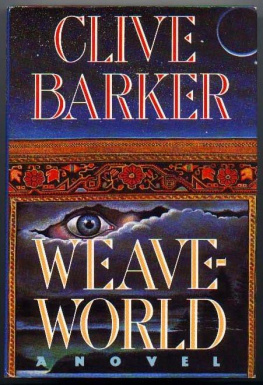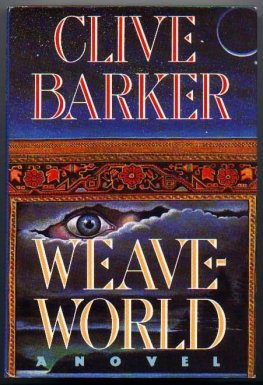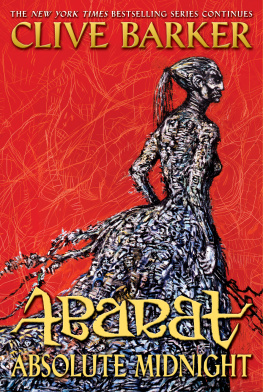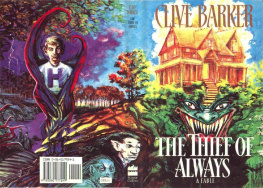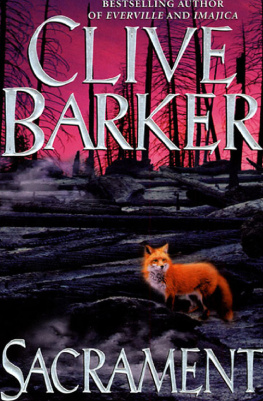Clive Barker - Imajica (The Fifth Dominion, Book 1)
Here you can read online Clive Barker - Imajica (The Fifth Dominion, Book 1) full text of the book (entire story) in english for free. Download pdf and epub, get meaning, cover and reviews about this ebook. year: 1995, publisher: HarperTorch, genre: Detective and thriller. Description of the work, (preface) as well as reviews are available. Best literature library LitArk.com created for fans of good reading and offers a wide selection of genres:
Romance novel
Science fiction
Adventure
Detective
Science
History
Home and family
Prose
Art
Politics
Computer
Non-fiction
Religion
Business
Children
Humor
Choose a favorite category and find really read worthwhile books. Enjoy immersion in the world of imagination, feel the emotions of the characters or learn something new for yourself, make an fascinating discovery.
- Book:Imajica (The Fifth Dominion, Book 1)
- Author:
- Publisher:HarperTorch
- Genre:
- Year:1995
- Rating:4 / 5
- Favourites:Add to favourites
- Your mark:
- 80
- 1
- 2
- 3
- 4
- 5
Imajica (The Fifth Dominion, Book 1): summary, description and annotation
We offer to read an annotation, description, summary or preface (depends on what the author of the book "Imajica (The Fifth Dominion, Book 1)" wrote himself). If you haven't found the necessary information about the book — write in the comments, we will try to find it.
Imajica (The Fifth Dominion, Book 1) — read online for free the complete book (whole text) full work
Below is the text of the book, divided by pages. System saving the place of the last page read, allows you to conveniently read the book "Imajica (The Fifth Dominion, Book 1)" online for free, without having to search again every time where you left off. Put a bookmark, and you can go to the page where you finished reading at any time.
Font size:
Interval:
Bookmark:
Imajica: Complete Edition
By
Clive Barker


"Magic is the first and last religion of the world. It has the power to make us whole, to open our eyes to the Dominions and return us to ourselves. Everything that isn't us is also ourselves. We're joined to everything that was, is and will be. From one end of the Imajica to another. From the tiniest mote dancing over this flame to the Godhead Itself."
It was the pivotal teaching of Pluthero Quexos, the most celebrated dramatist of the Second Dominion, that in any fiction, no matter how ambitious its scope or profound its theme, there was only ever room for three players. Between warring kings, a peacemaker; between adoring spouses, a seducer or a child. Between twins, the spirit of the womb. Between lovers, Death. Greater numbers might drift through the drama, of course-thousands in fact-but they could only ever be phantoms, agents, or, on rare occasions, reflections of the three real and self-willed beings who stood at the center. And even this essential trio would not remain intact; or so he taught. It would steadily diminish as the story unfolded, three becoming two, two becoming one, until the stage was left deserted.
Needless to say, this dogma did not go unchallenged. The writers of fables and comedies were particularly vociferous in their scorn, reminding the worthy Quexos that they invariably ended their own tales with a marriage and a feast. He was unrepentant. He dubbed them cheats and told them they were swindling their audiences out of what he called the last great procession, when, after the wedding songs had been sung and the dances danced, the characters took their melancholy way off into darkness, following each other into oblivion.
It was a hard philosophy, but he claimed it was both immutable and universal, as true in the Fifth Dominion, called Earth, as it was in the Second.
And more significantly, as certain in life as it was in art.
Being a man of contained emotion, Charlie Estabrook had little patience with the theater. It was, in his bluntly stated opinion, a waste of breath: indulgence, flummery, lies. But had some student recited Quexos First Law of Drama to him this cold November night he would have nodded grimly and said: Ail true, all true. It was his experience precisely. Just as Quexoss Law required, his story had begun with a trio: himself, John Furie Zacharias, and, between them, Judith. That arrangement hadnt lasted very long. Within a few weeks of setting eyes on Judith he had managed to supersede Zacharias in her affections, and the three had dwindled to a blissful two. He and Judith had married and lived happily for five years, until, for reasons he still didnt understand, their joy had foundered, and the two had become one.
He was that one, of course, and the night found him sitting in the back of a purring car being driven around the frosty streets of London in search of somebody to help him finish the story. Not, perhaps, in a fashion Quexos would have approved of-the stage would not be left entirely empty-but one which would salve Estabrooks hurt.
He wasnt alone in his search. He had the company of one half-trusted soul tonight: his driver, guide, and procurer, the ambiguous Mr. Chant. But despite Chants shows of empathy, he was still just another servant, content to attend upon his master as long as he was promptly paid. He didnt understand the profundity of Estabrooks pain; he was too chilly, too remote. Nor, for all the length of his family history, could Estabrook turn to his lineage for comfort. Although he could trace his ancestors back to the reign of James the First, he had not been able to find a single man on that tree of immoralities-even to the bloodiest root-who had caused, either by his hand or hiring, what he, Estabrook, was out this midnight to contrive: the murder of his wife.
When he thought of her (when didnt he?) his mouth was dry arid his palms were wet; he sighed; he shook. She was in his minds eye now, like a fugitive from some more perfect place. Her skin was flawless and always cool, always pale; her body was long, like her hair, like her fingers, like her laughter; and her eyes, oh, her eyes, had every season of leaf in them: the twin greens of spring and high summer, the golds of autumn, and, in her rages, black midwinter rot.
He was, by contrast, a plain man: well scrubbed but plain. Hed made his fortune selling baths, bidets and toilets, which lent him little by way of mystique. So, when hed first laid eyes on Judith-shed been sitting behind a desk at his accountants office, her beauty all the more luminous for its drab setting-his first thought was: I want this woman; his second: She wont want me. There was, however, an instinct in him when it came to Judith that hed never experienced with any other woman. Quite simply, he felt she belonged to him, and that if he turned his wit to it, he could win her. His courtship had begun the day theyd met, with the first of many small tokens of affection delivered to her desk. But he soon learned that such bribes and blandishments would not help his case. She politely thanked him but told him they werent welcome. He dutifully ceased to send presents and, instead, began a systematic investigation of her circumstances. There was precious little to learn. She lived simply, her small circle vaguely bohemian. But among that circle he discovered a man whose claim upon her preceded his own, and to whom she was apparently devoted. That man was John Furie Zacharias, known universally as Gentle, and he had a reputation as a lover that would have driven Estabrook from the field had that strange certainty not been upon him. He decided to be patient and await his moment. It would come.
Meanwhile he watched his beloved from afar, conspiring to encounter her accidentally now and again, and researching his antagonists history. Again, there was little to learn. Zacharias was a minor painter, when he wasnt living off his mistresses, and reputedly a dissolute. Of this Estabrook had perfect proof when, by chance, he met the fellow. Gentle was as handsome as his legends suggested, but looked, Charlie thought, like a man just risen from a fever. There was something raw about him-his body sweated to its essence, his face betraying a hunger behind its symmetry-that lent him a bedeviled look.
Half a week after that encounter, Charlie had heard that his beloved had parted from the man with great grief and was in need of tender care. Hed been quick to supply it, and shed come into the comfort of his devotion with an ease that suggested his dreams of possession had been well founded.
His memories of that triumph had, of course, been soured by her departure, and now it was he who wore the hungry, yearning look hed first seen on Furies face. It suited him less well than it had Zacharias. His was not a head made for haunting. At fifty-six, he looked sixty or more, his features as solid as Gentles were spare, as pragmatic as Gentles were rarefied. His only concession to vanity was the delicately curled mustache beneath his patrician nose, which concealed an upper lip hed thought dubiously ripe in his youth, leaving the lower to jut in lieu of a chin.
Now, as he rode through the darkened streets, he caught sight of that face in the window and perused it ruefully. What a mockery he was! He blushed to think of how shamelessly hed paraded himself when hed had Judith on his arm; how hed joked that she loved him for his cleanliness, and for his taste in bidets. The same people whod listened to those jokes were laughing in earnest now, were calling him ridiculous. It was unbearable. The only way he knew to heal the pain of his humiliation was to punish her for the crime of leaving him.
Next pageFont size:
Interval:
Bookmark:
Similar books «Imajica (The Fifth Dominion, Book 1)»
Look at similar books to Imajica (The Fifth Dominion, Book 1). We have selected literature similar in name and meaning in the hope of providing readers with more options to find new, interesting, not yet read works.
Discussion, reviews of the book Imajica (The Fifth Dominion, Book 1) and just readers' own opinions. Leave your comments, write what you think about the work, its meaning or the main characters. Specify what exactly you liked and what you didn't like, and why you think so.

